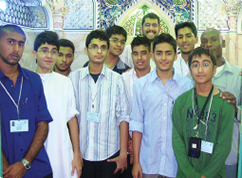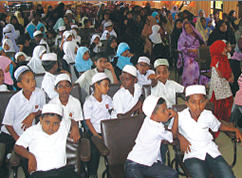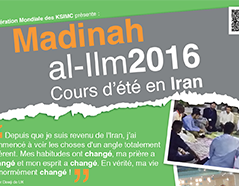Bio of Sayyida Fatima (sa)
|
Name
|
Sayyida Fatima (sa)
|
|
Titles
|
Fatima, al-Siddiqa, al-Mubaraka, al-Tahira, al-Zakkiyya, al-Mardhiyya, al-Muhaddatha and al-Zahra
|
|
Kunya
|
Abiha, Umm al-A’immah
|
|
Date of Birth
|
20th Jumada ath-Thaniya 8BH
|
|
Father
|
Prophet Muhammad (saw)
|
|
Mother
|
Khadija bint Khuwaylid
|
|
Date of Death
|
3rd Jumada ath-Thaniya 11AH
|
|
Place of Death
|
|
Amongst many narrations bestowed upon us, history has a common theme which outlines how Sayyida Fatima (sa), through her voice, shook the very foundations of injustice, which existed deep within the darkness of the hearts of the disbelievers. This statement in itself is a source of empowerment for the believers. At no point during her short yet difficult life did her faith once falter in Allah (swt)’s plan.
Since birth, Sayyida Fatima (sa) was blessed with the ability to absorb and comprehend what her father taught her. She was endowed with unimaginable intellectual brilliance to such an extent that she was able to fathom the complexity and understanding of faith and the true meaning of Islam, in a way that others could only dream of.
Sayyida Fatima (sa) was the only daughter of our Holy Prophet (saw) from his first wife Khadija bint Khuwaylid. Often referred to as “The Mother of Imams”, this self-explanatory title continues to resonate and touch the heart of millions of Shias until the present day in the 21st century. Although her life only spanned a mere 18 years, the purpose of her existence was certainly fulfilled within this short time, especially as the daughter of the Prophet of Islam.
When her mother Khadija left this world, she immediately filled her mother’s place as the Holy Prophet (saw)'s shoulder and his support. No other example is more fitting to describe this woman than that of the courage and bravery she showed on the fields of the battle of Uhud, when she cared for her father’s injury the moment she noticed he was wounded. Her fear was engulfed by her faith in Allah (swt)’s protection, which made her race to her father’s rescue.
Narrations allow us to paint a picture of Sayyida Fatima (sa) as a wife, noble and loving. She brought up her children with the same principles and love as she was brought up with, and her success resonates from the blood shed by her sons on the battle of Karbala, as they followed in their mother's footsteps, to bring down the pillars of injustice.
After the death of her father, the Holy Prophet (saw), the family were unable to grieve in peace as there was constant conflict as a result of Imam Ali (as) declining to pledge allegiance to the oppressors. The individuals that transgressed against the Holy household were outraged at Imam Ali (as)’s unwillingness to pledge allegiance to the point where they came outside the door of the Holy Prophet (saw)’s house and when refused entry, they attempted to light the door of her house on fire. The first martyr of that bitter day was the unborn child of Sayyida Fatima (sa), Muhsin, who passed away on impact as the oppressors trapped her between the wall and the door. The blood of Sayyida Fatima (sa) was shed when her skin was penetrated with the blunt tip of the nail sticking out of the door.
The Lady of Light departed from this intermediary world, leaving the knowledge of the exact location of her resting place to her husband Imam Ali (as) (and only the 14 infallible possess the knowledge to this), as it was her wish to be buried in an undisclosed location somewhere within the soil of Jannatul-Baqi.
Sayyida Fatima (sa)’s names and meanings:
Umme Abiha (Mother of her father)
● This term was awarded to the noble lady because of the way she looked after her father when her mother Khadija passed away. During a very hard year of turmoil for the household of the Holy Prophet (saw), she became the strength of her father. It was, and still is, a custom among the Arab to address their girls with a title ‘umm ..’ Sayyidah Faatimah was nicknamed ‘umm Abiha’ 'by her noble father from a very young age. She was called so because she immensely loved and took care of the father just like a mother would.
al-Siddiqa الصديقة (the exceptionally truthful one)
● This name originates from the Arabic root word “sidq” which means “truth”. Her faith in the divine message of Allah (swt), and her father being appointed the last messenger meant that in her life she didn't once doubt the truth of the message. Even through her many trials and tribulations, her faith in the Almighty meant that she was labelled the truthful one, the one that did not doubt. Al-siddiqa is the one from whom much truth is heard, rather, it refers to one who never tells a lie. Some define it as one who is most complete in truthfulness and whose deeds match her words.
al-Mubaraka المباركة (the blessed one)
● Sayyida Fatima (sa) is the wife of the first of the 12 Shia Imams, hence the subsequent Imams that were born into this world were her sons. Sayyida Fatima (sa) is perceived as the one from which abundant blessings came from. Allah (swt) blessed Sayyida Fatima (sa) and placed the progeny of the Prophet of Allah (saw) in her descendants.
al-Tahira الطاهرة (the pure one)
● The Arabic word ‘Tahir’ in Islamic context refers to purity or cleanliness, and as the Quran states “And Allah only wished to keep all abomination far from you, oh members of the family, and to keep you pure and spotless.”(33:33). This ayat, therefore, tells us that the daughter of the Prophet of Islam (saw) is At-Tahira, and so this title is greatly befitting for a woman of her stature. Imam Baqir as says: Fatima bint Muhammad was named al-Tahirah because of her purity from every form of filth and pollution...”(Bihar al-anwar vol 43, pg19)
al-Zakiyya الزكية (the chaste one)
● Sayyida
Fatima (sa) was pure and free from all sins so for that reason she is called Az-Zakiya. The word means purification and growth. She is al-zakiyyah meaning that she is purified from all filth.
al-Mardhiyya المرضية (the one who shall be pleased [on Judgment Day])
● As the quran says - “Return to your Lord, well-pleased (with him), well-pleasing (Him). (89:28). This is what Sayyida Fatima (sa) strived to do, and she certainly succeeded. Thus this title was awarded to her by Allah (swt)’s grace.
al-Muhaddatha المحدثة (the one, other than the Holy Prophet (saw), to whom an angel speaks)
● Allah granted her this ability through his mercy. This means the one who is inspired or has a true intution. Imam Sadiq (as) says: Fatima was named Muhadathah because the angels would descend from the heavens and call out to her, just as they called out to Maryam, daughter of Imran ...” ( ilal al sharai, vol 1, or 182)
al-Zahra الزهراء (the radiant one).
● Sayyida Fatima (sa) is called Az-Zahra because, as Ibn Abbas narrates, the Prophet of Allah (swt) said: “Surely my daughter Fatima is the Mistress of all women from the beginning to the end. She is a part of me, and the light of my eyes. She is the flower of my heart, and is my soul. Fatima is a human huri, who whenever she stands in prayers in the presence of her Lord (Exalted is His name), her light illuminates the skies for the angels, like stars shine to people on Earth.” The Holy Prophet (saw) said 'Allah (swt) created the light of Fatima al-zahra like a lamp and hung it on the side of the throne. Thus it has illuminated the seven heavens and the seven earths. And this is the reason that Fatima was called al-zahra (the radiant)” (Bihar al-anwar, vol 43,pg17).
Sources:
https://www.al-islam.org/fatima-the-daughter-of-muhammad-a-brief-biography-yasin-al-jibouri
http://www.shiitenews.org/index.php/articles/item/21296-martyrdom-of-sayyida-fatima-al-zahra-last-day-of-her-life
https://www.imam-us.org/martyrdom-anniversary-sayyida-fatimah-al-zahra-p/










